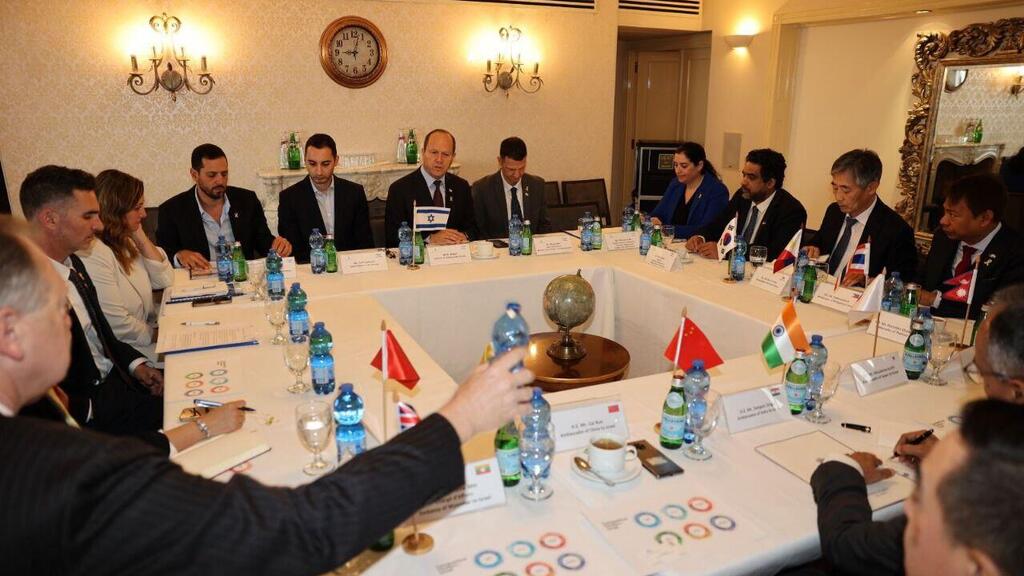Our Terms & Conditions | Our Privacy Policy
Investment agreements with India and the UAE could redraw Israel’s geoeconomic map
In the hot quiet of July 2025, while global investors scan bond spreads and rating reports, something far more subtle, and potentially transformative, is unfolding across Israel’s strategic horizon. Amid domestic budgetary pressures and ongoing regional tension, Israel is quietly reshaping its international economic posture, not through arms deals or tech exports, but by renegotiating the legal scaffolding of its foreign investments.
At the center of this shift is the long-overdue replacement of outdated bilateral investment treaties signed in the 1990s, relics of a pre-digital, pre-globalized era. The new generation of agreements is designed not only to encourage capital flow, but also to signal Israel’s readiness to anchor itself within emerging spheres of global influence, most notably in the Global South.
2 View gallery

Ambassadors from Indo-Pacific countries meet with Economy Minister Nir Barkat in 2024
(Photo: Economy Ministry)
Nowhere is this more evident than in the fast-developing investment accord with India. On July 8, 2025, both countries confirmed they were in the final stages of ratifying a bilateral investment protection agreement (IPA), a framework meant to safeguard cross-border capital, ensure dispute resolution and prevent discriminatory treatment of investors.
With bilateral trade volumes already nearing $4 billion as of 2024, dominated by defense, technology and infrastructure, the deal has far-reaching implications. It formalizes a shift in strategy: from opportunistic trade to long-term economic integration.
India, now one of the most influential BRICS economies, has become more than a commercial partner; it is a geopolitical pivot. Its growing economic footprint, stable democratic governance and close ties with both Western and non-Western blocs make it a prime candidate for strategic alignment. For Israel, forging deeper investment links with India is not just about market access, it’s about anchoring itself to a rising center of power outside the traditional Euro-American orbit.
In parallel, another front is quietly gaining traction: the prospect of a similar investment agreement with the United Arab Emirates. Since the 2020 Abraham Accords, trade between the two countries has surged to nearly $3 billion annually. Yet while goods, tourism and symbolic cooperation have flourished, the legal infrastructure for long-term capital flow remains incomplete. An IPA with the UAE, one of the most active signatories of such treaties globally, would unlock institutional trust for pension funds, sovereign wealth entities and long-horizon investors on both sides.
2 View gallery


Economy Minister Nir Barkat
(Photo: Avi Mohalem)
The significance of these agreements lies not just in their legal clarity, but in their geopolitical messaging. A formal investment framework with India ties Israel into the BRICS+ gravitational field without alienating the West. A similar pact with the UAE embeds Israel deeper into the Gulf’s evolving economic architecture, a region that increasingly functions as a corridor between East and West.
Taken together, these moves represent a deliberate attempt to diversify Israel’s economic alliances in a world no longer defined by binary blocs. As the dollar-centric financial order shows signs of stress, and as the global economy splinters into regional spheres of influence, Israel cannot afford to remain tied only to its legacy partners. Investment agreements are the quiet tools of strategic flexibility: they build bridges between trust and trade, between law and leverage.
But they are also a test. These agreements demand internal coherence, legal, fiscal and institutional. They signal not just openness to the world, but confidence in one’s own systems. In a year when Israel’s sovereign credit rating hangs in the balance, with public debt pushing toward 75% of GDP and fiscal deficit forecasts exceeding 6.5%, the ability to project economic stability is more important than ever.
The political optics matter, too. Where much of Israel’s diplomatic energy has been consumed by the drama of war, escalation and crisis management, these investment treaties offer a different narrative: one of construction, predictability and strategic patience. They imply that Israel is not just a state that innovates in times of crisis, but one that can institutionalize long-term opportunity.
 Dr. Bella Barda Bareket Photo: Lia Yaffe
Dr. Bella Barda Bareket Photo: Lia Yaffe
Should the agreement with India be finalized this quarter, and a similar treaty with the UAE follow suit by year’s end, Israel would find itself increasingly embedded in a multipolar investment web, one that spans from Mumbai to Abu Dhabi, bypassing traditional chokepoints of uncertainty. This would not only attract capital, but also grant the country geopolitical room to maneuver in a world where alliances are shifting and certainty is scarce.
In an era defined less by ideology and more by alignment, investment agreements have become the new diplomacy, written not in declarations, but in clauses. For Israel, the ink is almost dry. What remains is to build the institutional confidence required to make those signatures matter.
Images are for reference only.Images and contents gathered automatic from google or 3rd party sources.All rights on the images and contents are with their legal original owners.



Comments are closed.